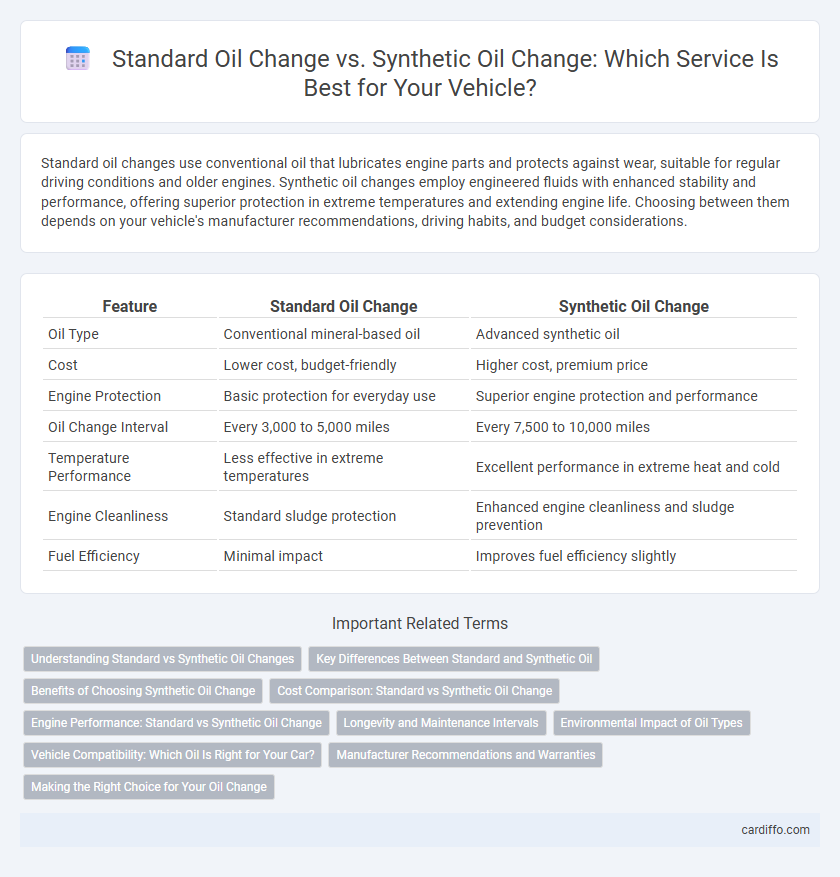Standard oil changes use conventional oil that lubricates engine parts and protects against wear, suitable for regular driving conditions and older engines. Synthetic oil changes employ engineered fluids with enhanced stability and performance, offering superior protection in extreme temperatures and extending engine life. Choosing between them depends on your vehicle's manufacturer recommendations, driving habits, and budget considerations.
Table of Comparison
| Feature | Standard Oil Change | Synthetic Oil Change |
|---|---|---|
| Oil Type | Conventional mineral-based oil | Advanced synthetic oil |
| Cost | Lower cost, budget-friendly | Higher cost, premium price |
| Engine Protection | Basic protection for everyday use | Superior engine protection and performance |
| Oil Change Interval | Every 3,000 to 5,000 miles | Every 7,500 to 10,000 miles |
| Temperature Performance | Less effective in extreme temperatures | Excellent performance in extreme heat and cold |
| Engine Cleanliness | Standard sludge protection | Enhanced engine cleanliness and sludge prevention |
| Fuel Efficiency | Minimal impact | Improves fuel efficiency slightly |
Understanding Standard vs Synthetic Oil Changes
Standard oil changes use conventional mineral-based oil, which provides adequate lubrication for most everyday vehicles and operates effectively within a typical temperature range. Synthetic oil changes involve chemically engineered lubricants designed to offer superior performance, enhanced engine protection, and better resistance to breakdown under extreme temperatures. Choosing between standard and synthetic oil depends on driving conditions, vehicle type, and manufacturer recommendations to optimize engine longevity and efficiency.
Key Differences Between Standard and Synthetic Oil
Standard oil change uses conventional oil derived from crude oil, offering basic engine protection suitable for older or low-mileage vehicles. Synthetic oil change involves chemically engineered oil that provides superior thermal stability, improved engine cleanliness, and longer intervals between changes. Key differences include viscosity stability, oxidation resistance, and enhanced lubrication performance in synthetic oil compared to standard oil.
Benefits of Choosing Synthetic Oil Change
Synthetic oil change provides superior engine protection by reducing friction and wear, leading to enhanced engine performance and longer engine life. It offers better resistance to oxidation and thermal breakdown, ensuring optimal lubrication under extreme temperatures and driving conditions. Choosing synthetic oil also improves fuel efficiency and reduces harmful emissions compared to standard oil.
Cost Comparison: Standard vs Synthetic Oil Change
Standard oil changes generally cost between $20 and $50, making them a budget-friendly option for regular vehicle maintenance. Synthetic oil changes typically range from $45 to $90, reflecting the higher quality and longer-lasting properties of synthetic oils. The increased upfront expense of synthetic oil changes is often offset by extended oil change intervals and improved engine performance.
Engine Performance: Standard vs Synthetic Oil Change
Synthetic oil change enhances engine performance by providing superior lubrication, reducing friction, and maintaining stability in extreme temperatures compared to standard oil change. The advanced formulation of synthetic oil prevents sludge buildup and reduces engine wear, promoting longer engine life and consistent horsepower. Standard oil change is suitable for older engines or low-mileage use, but synthetic oil change offers optimized efficiency and protection for modern high-performance engines.
Longevity and Maintenance Intervals
Synthetic oil changes typically offer extended longevity, allowing vehicles to go 7,500 to 10,000 miles between services compared to 3,000 to 5,000 miles for standard oil changes. This increased interval reduces overall maintenance frequency while providing superior engine protection under extreme temperatures and high-stress conditions. Choosing synthetic oil can lead to cost savings over time by minimizing wear and prolonging engine life.
Environmental Impact of Oil Types
Standard oil changes typically involve conventional petroleum-based oils that contain higher levels of impurities and break down faster, resulting in more frequent oil changes and increased environmental waste. Synthetic oil changes use engineered oils that last longer, reduce engine wear, and lower emissions due to improved viscosity and thermal stability, which decreases the environmental footprint. Choosing synthetic oils can lead to less oil consumption, reduced landfill contamination, and better resource efficiency compared to standard oils.
Vehicle Compatibility: Which Oil Is Right for Your Car?
Standard oil change suits older vehicles with simpler engine designs, offering cost-effective lubrication for engines less sensitive to oil quality. Synthetic oil change is ideal for modern, high-performance vehicles requiring superior engine protection, higher temperature tolerance, and enhanced fuel efficiency. Vehicle compatibility depends on manufacturer recommendations, driving conditions, and engine specifications to ensure optimal performance and longevity.
Manufacturer Recommendations and Warranties
Manufacturer recommendations often dictate the type of oil required for optimal engine performance and warranty compliance, with many specifying synthetic oil for modern engines due to its superior lubrication and longevity. Standard oil changes might void warranties if the vehicle's manufacturer explicitly requires synthetic oil, as synthetic formulations enhance protection under extreme temperatures and reduce engine wear. Adhering to manufacturer guidelines ensures warranty validity and aligns with the vehicle's maintenance schedule, preserving engine health and resale value.
Making the Right Choice for Your Oil Change
Selecting between a standard oil change and a synthetic oil change depends primarily on your vehicle's make, model, and driving habits. Standard oil offers effective lubrication and is cost-efficient for older models or low-mileage driving, while synthetic oil enhances engine performance, resists breakdown under extreme temperatures, and extends oil change intervals for modern, high-performance vehicles. Consulting your vehicle manufacturer's guidelines ensures the right choice for optimal engine protection and longevity.
Standard Oil Change vs Synthetic Oil Change Infographic

 cardiffo.com
cardiffo.com